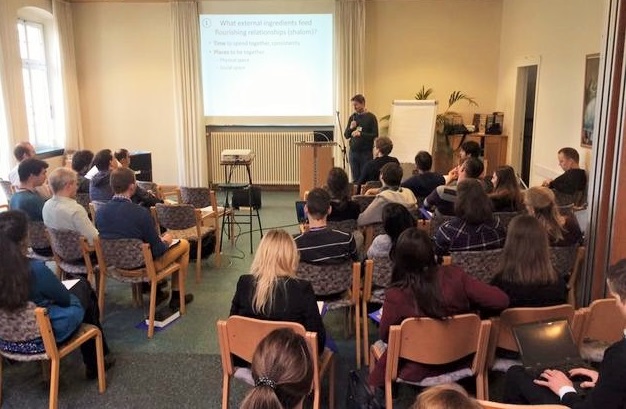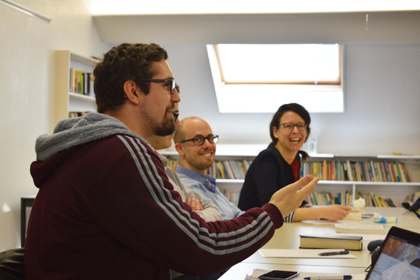Adrian Petrice, coordinator of IFES Graduate Impact, talks about the challenges for university graduates who start their work life. “Pray that they will give reason for the hope they have in Jesus”.
 A training session for young graduates in Europe. / IFES Graduate Impact
A training session for young graduates in Europe. / IFES Graduate Impact
Finishing university to start the work life is not always easy for young people in today's context.
Adrian Petrice, PhD in Political Sciences and the European field coordinator of IFES Graduate Impact, spoke to Evangelical Focus about this while attending the 2019 European Leadership Forum celebrated in Wisla, Poland.
Petrice explained that the IFES program “is not a very skill-oriented approach, but it is is a deeply relational program, we want them to look at the character of God and to understand that He is trustworthy”.
“We think that small is beautiful, because in small groups we can go deep. It is a journey, we invite people to walk together”, he explained.
The IFES coordinator called Christians to pray that young graduates “will speak life to their society, and give reason for the hope we have in Jesus, because it is real and it should impact our lives, our society and our professions”.
Petrice is from Romania, a country where “there is a gap between the cultural label of Christian, and a real Christian belief and behaviour”. However, many commited Romanian Christians “have started to speak to the society about their Christian worldview, to give Biblical answers. We have had a good progression from isolationism to sharing the faith”, Petrice added.
Question. Why are you atteding this year's ELF conference?
Answer. I am here representing IFES Graduate Impact, to learn. I am looking for opportunities to help young adults throughout Europe, as they transition from university to the work life, that is our main focus.
Q. You work with graduate students that are thinking what to do with their lives...
A. Yes, they might think what they want to do with their lives, but we want to make sure that they do not walk alone, they do not lose their faith. So that it will not be a 'Sunday faith' but a life-changing faith, which inspires them in their professions.
Q, Which are the challenges of young people in Europe when they finish university?
A. Our approach is not very skill-oriented, -although they get some training- but it is is a deeply relational program. We want them to look at the character of God and to understand that He is trustworthy.
Now we live in an environment where most of us will not have just one profession, even specific professions will change dramatically in a few years. There are many things to adapt to, and we want them to be rooted in the character of God, who is faithful, not matter what comes or how the profession might change.
 IFES Graduate Impact logo. / IFES
IFES Graduate Impact logo. / IFESQ. How do you work in practice? How is your training?
A. We think that “small is beautiful”, because in small groups we can go deep. It is all very relational, rooted in the Scriptures, and it is a journey, we invite people to walk together, it is actually a mentoring program.
It is 3 years long, and it involves a quite high commitment from the participant, but it is also very rewarding.
Q. Thinking of your home country, how would you define the current situation of Romania? What is the role of the evangelical churches there?
A. Romanian society looks up to the Western culture.
In a country where more than 90% would identify themselves as Christian, there is a gap between the cultural label of “Christian”, and a real Christian belief and behaviour. The role of the church is to try to nurture people, so that they will really live their faith out.
Good things are happening. There has been a transition from not being involved to being more active in society. Churches have started to work together when it comes to specific issues. They have started to speak to the society about their Christian worldview, to give Biblical answers. We have had a good progression from isolationism to sharing the faith.
 Time for discussion in an IFES Graduate Impact meeting. / IFES
Time for discussion in an IFES Graduate Impact meeting. / IFESQ. How can Christian pray for Romania and for young graduates who are starting their working life?
A. Pray for European politicians, that they might have good values and be salt and light. Because politics also needs light, and we should be able to communicate it, not in an arrogant or judgemental way, but with boldness.
I also ask you to, please, pray for our team, our ministry. We are a small group and there is so much to be done. We work in Eurasia, 48 countries, in the most secularised continent. But there is hope because we also work with the most privileged people who are graduates, have an education, and live in Europe.
Pray that we will inspire, encourage and nurture them, so that they speak life to their society and give reason for the hope we have in Jesus, because it is real and it should impact our lives, our society and our professions.
WATCH THE INTERVIEW WITH ADRIAN PETRICE:

Las opiniones vertidas por nuestros colaboradores se realizan a nivel personal, pudiendo coincidir o no con la postura de la dirección de Protestante Digital.
Si quieres comentar o